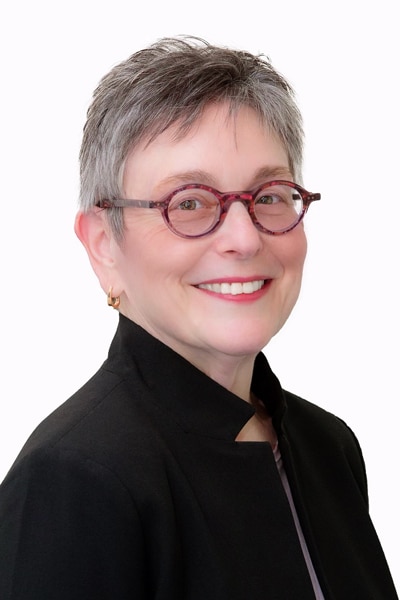It’s not by chance that Laurie E. Weinstein has worked in healthcare systems of all models. “I’ve always been interested in the challenges of new things,” Weinstein notes. “I thrive on change and on a fast pace.”
Weinstein is currently seeking out new challenges as executive vice president and general counsel at Maimonides Medical Center, Brooklyn’s largest hospital. Initially attracted to the hospital by a unique leadership perspective—the CEO has a background in business and finance rather than medicine or government—she now applies her extensive legal and healthcare expertise to provide trusted counsel to executives and aspiring attorneys alike.

Weinstein began building her knowledge as a private practitioner after graduating from Suffolk University Law School. She spent three years handling matters in probate and family court while also starting to explore health law. Her efforts allowed her to step into the role of assistant general counsel at the Massachusetts Department of Mental Health in 1989.
During her time at the Department of Mental Health, Weinstein was sole counsel to a state psychiatric hospital as well as providing counsel to a medium-security treatment center where she focused on legal issues pertaining to sexually dangerous persons. She then moved to the University of Massachusetts, accepting a role as associate counsel for the university’s five campuses.
“I was hired to bring my experience from the Department of Mental Health with respect to informed consent and related patient care matters to the University’s medical school and medical center,” Weinstein explains.
Beyond patient care work, Weinstein was introduced to corporate healthcare as she was asked to take on the challenge of collapsing a city authority and merging components of it with the university. At the same time, she developed and implemented a parallel corporate structure that provided the foundation for the medical center’s privatization and merger with Memorial Health Care.
Following the merger, Weinstein became UMass Memorial Health Care’s associate general counsel. “I was responsible for creating and maintaining the system of corporate entities that we developed de novo and through mergers and acquisitions of physician practices, hospitals, clinics, surgery centers, and the like,” she says of the role.
Seven years later, Weinstein moved to Harvard Medical School’s teaching hospital, Beth Israel Deaconess Medical Center (BIDMC), as deputy general counsel. While at BIDMC, she executed a number of acquisitions, joint ventures, and strategic affiliations, including one with Massachusetts’s largest multispecialty physician group.
In addition, Weinstein transitioned the corporate structure of BIDMC’s faculty practice plan to a quasi-independent model. She also established BIDMC’s first hospital within a hospital, the CardioVascular Institute.
Her role in creating the CardioVascular Institute at BIDMC brought Weinstein to the attention of the new CEO of Caritas Christi Health Care (CCHC), a six-hospital Catholic system in Boston. Weinstein came on board as CCHC’s vice president and deputy general counsel and facilitated the system’s sale to a private equity firm.
Through the sale, CCHC became Steward Health Care. Weinstein went on to play a critical part in building out Steward through numerous hospital and physician practice acquisitions.
“I’m a big believer in not being afraid of what you don’t know. There is still so much to learn.”
“Working for a private-equity-owned healthcare system gave me a very different perspective,” says Weinstein. “Having seen so many different models for the delivery of healthcare enables me to think more broadly about ways to approach challenges.”
The Permanente Medical Group, Inc. (TPMG), the largest medical group in the United States, recruited Weinstein as managing counsel in 2014. She oversaw TPMG’s legal department for the next six years, spending over one year as acting general counsel. During that period, the scope of her legal services extended to TPMG’s Mid-Atlantic group as well.
The depth of Weinstein’s experience made her the perfect fit for Maimonides, which she joined in October 2020. “I saw that the organization had amazing potential, but it also faced enormous challenges. I wanted to help overcome some of those challenges and to make a difference for Brooklyn’s incredibly diverse community,” she says.
In her current role, Weinstein oversees a team of four attorneys and collaborates closely with Maimonides’ leadership to guide the hospital through its transformation work amid the COVID-19 pandemic. Even amid ongoing difficulties, she continues to provide excellent client service by offering counsel drawn from the cumulative expertise that she has acquired over the years.
Weinstein leans on that same knowledge base during informational interviews and other interactions with up-and-coming attorneys. One point that she emphasizes to those attorneys when talking about how to navigate an in-house career is the importance of fostering client relationships.
“Oftentimes, clients are looking to you for much more than legal advice,” Weinstein elaborates. “My most gratifying transformation over the years has been becoming a valued thought partner of executive leadership.”
That transformation marks yet another experience for Weinstein to add to her repertoire. It reminds her that she is still growing as an attorney—something for which she is grateful. As for the source of her continuing growth, she believes that it stems from her willingness to say ‘yes’ to new opportunities and to venture into unfamiliar territory without hesitation.
“I’m a big believer in not being afraid of what you don’t know,” says Weinstein. “There is still so much to learn.”


